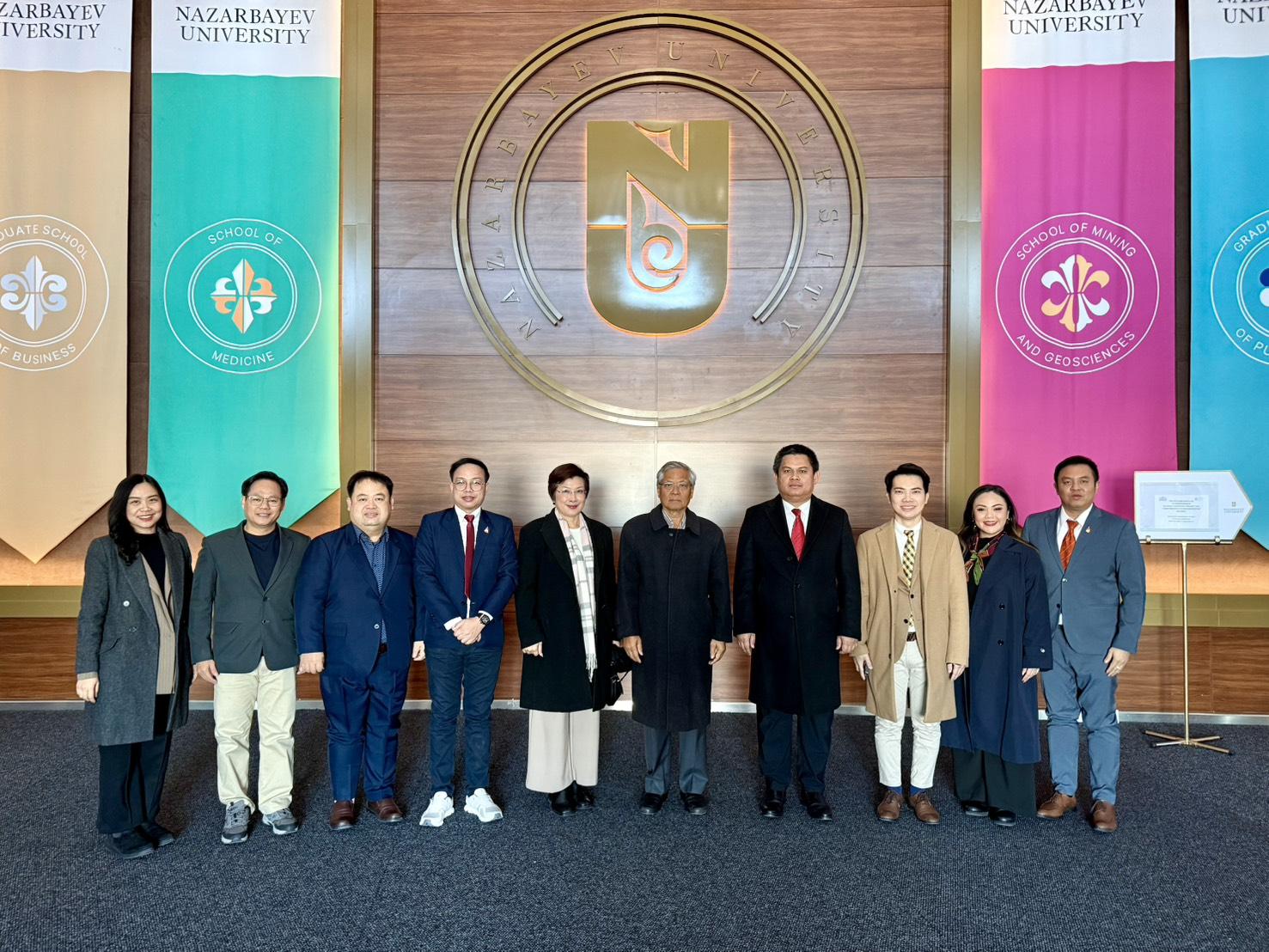
From March 10-13, 2025, a delegation from Khon Kaen University, including Mr. Surapon Petch-vra, the Vice Chairman of the University Council, Assoc. Prof. Issara Kanjug, Dean of the Faculty of Education, Asst. Prof. Sirimonbhorn Thipsingh, Dean of International College, and Asst. Prof. Dr. Sirisak Laochankham, Dean of the College of Local Administration, along with other executives, visited Astana, Kazakhstan. The purpose of the visit was to expand academic and research collaborations with leading educational institutions in Kazakhstan, which is considered the top academic hub in Central Asia.
The initiative to expand collaboration in Kazakhstan stems from the strong diplomatic relations between Thailand and Kazakhstan in recent years. Both countries have implemented visa-free policies for their citizens, and Kazakhstan views Thailand as a key travel destination, particularly for tourism. Kazakhstan, a rapidly developing nation in Central Asia, is advancing in economics, science, and technology. Located along the Silk Road and the Belt and Road Initiative, Kazakhstan serves as a strategic link to Thailand and Southeast Asia. This presents an excellent opportunity for KKU to establish and explore new academic and research collaborations with Kazakh institutions.
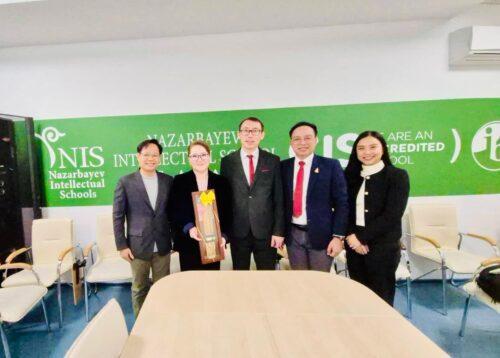
Assoc. Prof. Dr. Issara Kanjug, Dean of the Faculty of Education, stated that under the policy provided by the university president regarding the development of the International Network: KKU Teamwork strategy, led by the Vice President of the University Council and executives from the Faculty of Education (ED), the College of Local Administration (COLA), and the International College (IC), an academic collaboration network has been established with Nazarbayev Intellectual Schools (NIS). NIS operates 22 schools across Kazakhstan and is considered the most prestigious and innovative school model in the country. Its vision is: “We provide high learning and teaching in a safe and inclusive environment in a changing world.” Students at NIS are nurtured through a globally standardized curriculum, emphasizing the development of a Global Mindset and Leadership while fostering friendliness and mutual respect. The teaching approach focuses on multilingual education, aligning with the new curriculum of the Khon Kaen University International Demonstration School (KKUIDS), which the Faculty of Education has developed and plans to implement in the upcoming academic year.
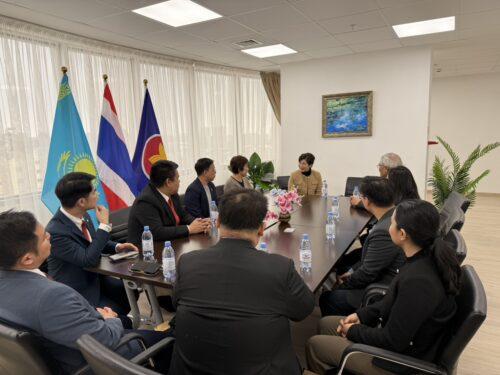
Asst. Prof. Sirimonbhorn Thipsingh, Dean of the International College, stated that the International College aims to explore new markets and collaborations with countries and educational institutions with high potential. This effort seeks to foster proactive collaboration and marketing for prospective students interested in the college’s programs, as well as to promote research and student development. The college, in collaboration with the team, has engaged in discussions with NIS to organize Immersive Programs/Summer Programs for NIS students interested in participating in activities in Thailand. Additionally, academic and research collaborations were discussed with the School of Social Sciences and Humanities at Nazarbayev University. Both institutions have planned to drive academic activities and student development initiatives together in the future.
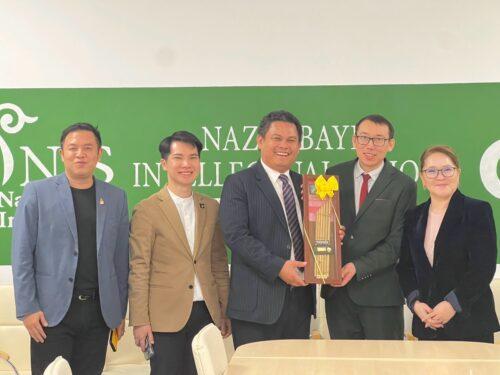
Asst. Prof. Dr. Sirisak Laochankham, Dean of the College of Local Administration (COLA), highlighted the significance of the visit to Kazakhstan, stating that the COLA team held discussions with the executives of the Graduate School of Public Policy (GSPP) at Nazarbayev University. GSPP is the leading institution in Public Policy and Public Administration in Kazakhstan and Central Asia, with its programs internationally accredited by NASPAA and EAPAA. Despite being established relatively recently in 2010, GSPP has rapidly achieved international recognition due to its sharp and strategic approach. It is noteworthy that the Lee Kuan Yew School of Public Policy at NUS, Singapore, served as a strategic partner in founding GSPP and laying its foundation, which has led to its acceptance and collaboration with leading institutions worldwide.
1.การสร้างเครือข่ายการวิจัยร่วมด้านกิจการสาธารณะและนโยบายสาธารณะเชื่อมอาเซียน/ลุ่มน้ำโขงและเอเชียกลาง ในประเด็นที่ทั้งสองฝ่ายเห็นพ้องต้องกัน (ทันสมัย ศึกษาเปรียบเทียบ และเป็นบริบทเฉพาะของแต่ละพื้นที่) ตามนโยบายของ มข.
2.การจัด Webinar Series on Public Affairs & Policy ร่วมกัน
3.การแลกเปลี่ยนอาจารย์และนักศึกษาระดับบัณฑิตศึกษา ระยะสั้น (COLA Graduate Student Mobility)
4.การร่วมจัด/แลกเปลี่ยนเข้าร่วมประชุมวิชาการนานาชาติและร่วมนำเสนอผลงาน
5.การให้คำแนะนำการเข้าสู่การได้รับการรับรองมาตรฐานหลักสูตรปริญญาโท ของ NASPAA และโดยเร็ว ๆ นี้ ทั้งสองฝ่ายจะริเริ่มดำเนินกิจกรรมแบบ Quick Win ในระยะแรกเพื่อให้ได้รู้จักกันมากยิ่งขึ้น อันจะนำไปสู่การพัฒนาข้อตกลงความร่วมมือระหว่างสถาบันอย่างเป็นทางการในอนาคต
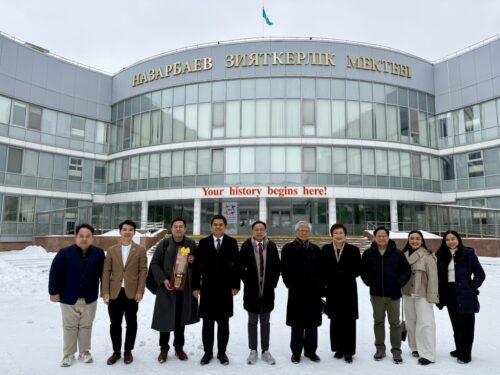
The delegation aimed to establish partnerships with several institutions, including Nazarbayev Intellectual Schools (NIS) and Nazarbayev University (NU), both of which are highly regarded in Kazakhstan.
Collaboration with Nazarbayev Intellectual Schools (NIS):
NIS operates 22 schools across Kazakhstan and is considered a model for innovative education in the country. Its vision emphasizes high-quality learning in a safe and inclusive environment, fostering global mindsets and leadership skills.
The KKU delegation visited NIS to observe teaching methods, interact with students, and discuss potential collaborations. Key outcomes include:
Developing extracurricular programs to enhance students’ skills and cultural understanding.
Establishing a partnership school model to share expertise in curriculum design, teaching methods, and teacher development.
Creating joint student projects through online platforms to build portfolios.
Collaboration with Nazarbayev University (NU):
NU is a rapidly growing university ranked 176-200 globally in Education Studies by THE. It collaborates with world-class institutions like the University of Pennsylvania and the University of Cambridge.
Discussions with NU’s Graduate School of Education (GSE) focused on:
Joint research and researcher exchanges.
The visit also included discussions with the Thai Ambassador to Kazakhstan to explore opportunities for educational diplomacy. Initial plans include:
Sending KKU students for international internships in Kazakhstan.
Organizing immersive programs for Kazakh students and government officials in Thailand.
Hosting webinars and joint research initiatives to enhance international collaboration.
In June 2025, the Thai Embassy in Astana will collaborate with KKU to bring medical professionals from Central Asia to Thailand, with plans to visit KKU as part of the program. Although Kazakhstan is relatively new to Thai academia, it is a rapidly growing country with significant potential for academic and research partnerships, particularly for KKU, which serves as a gateway to the Greater Mekong Subregion and aligns with the Belt and Road Initiative.
This visit marks a significant step in fostering international collaboration and expanding KKU’s global academic network.
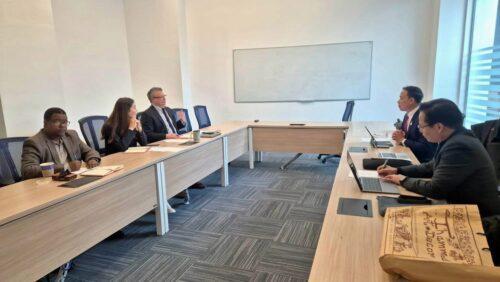
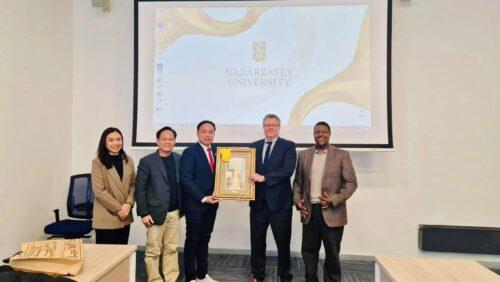
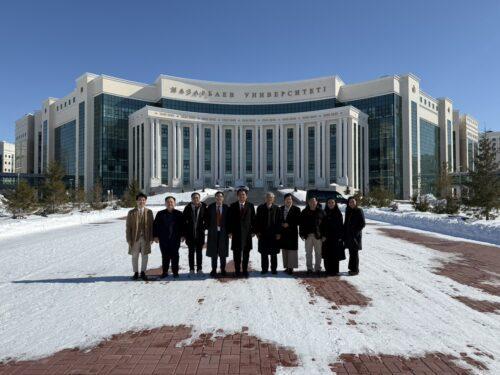
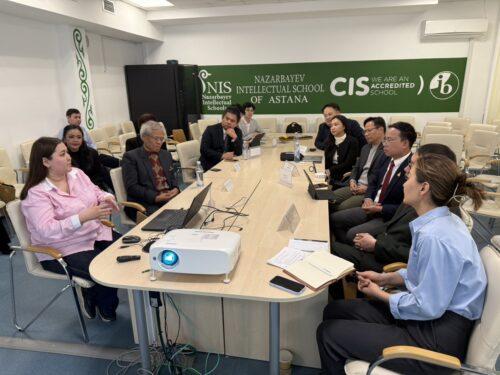
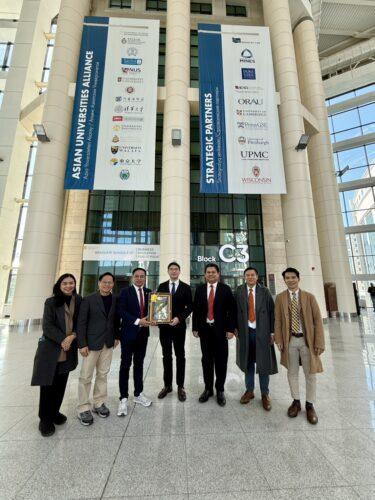
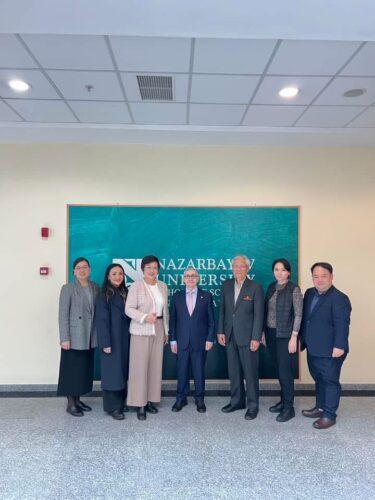
News: COLA, KKU
Source: https://www.kku.ac.th/19317
Poster : พราวแสง ภูสิงหา [Ms. Prowsaeng Poosinghar] | 3 เมษายน 68